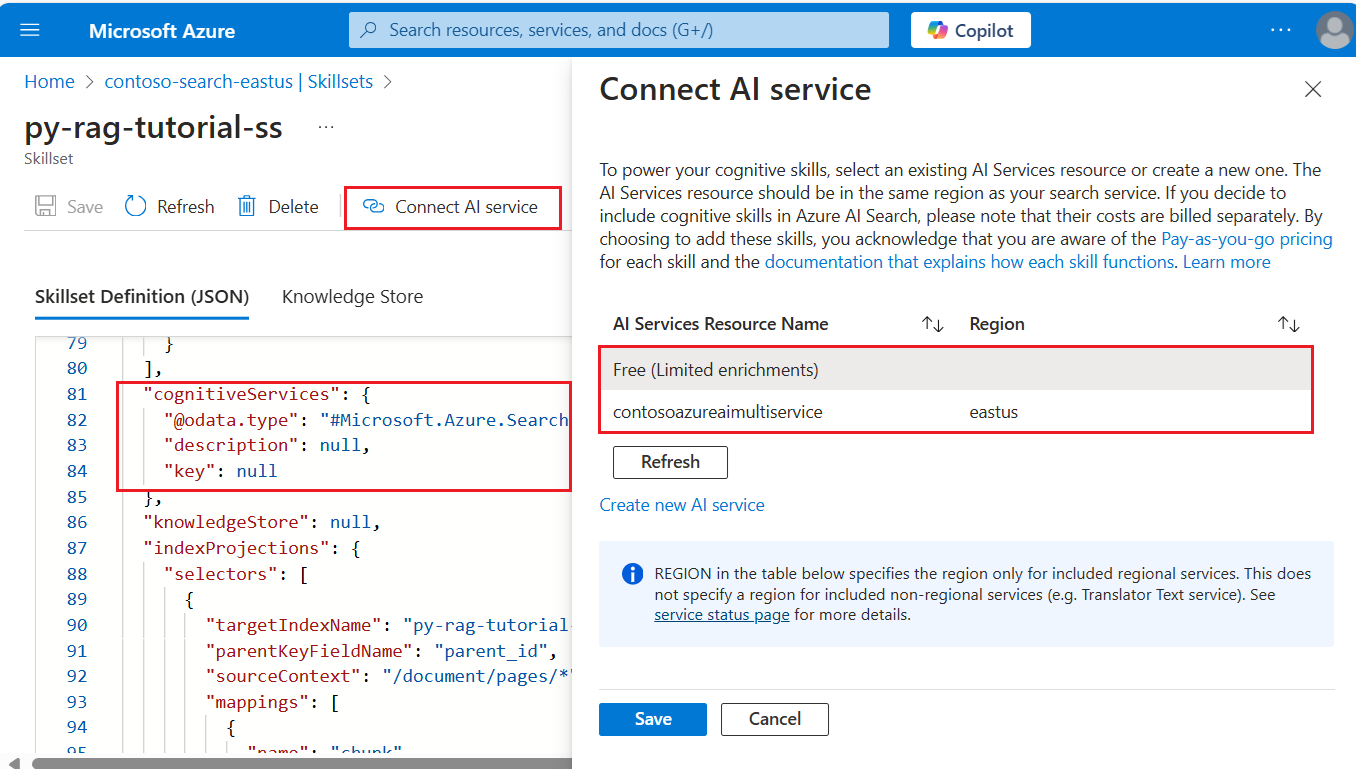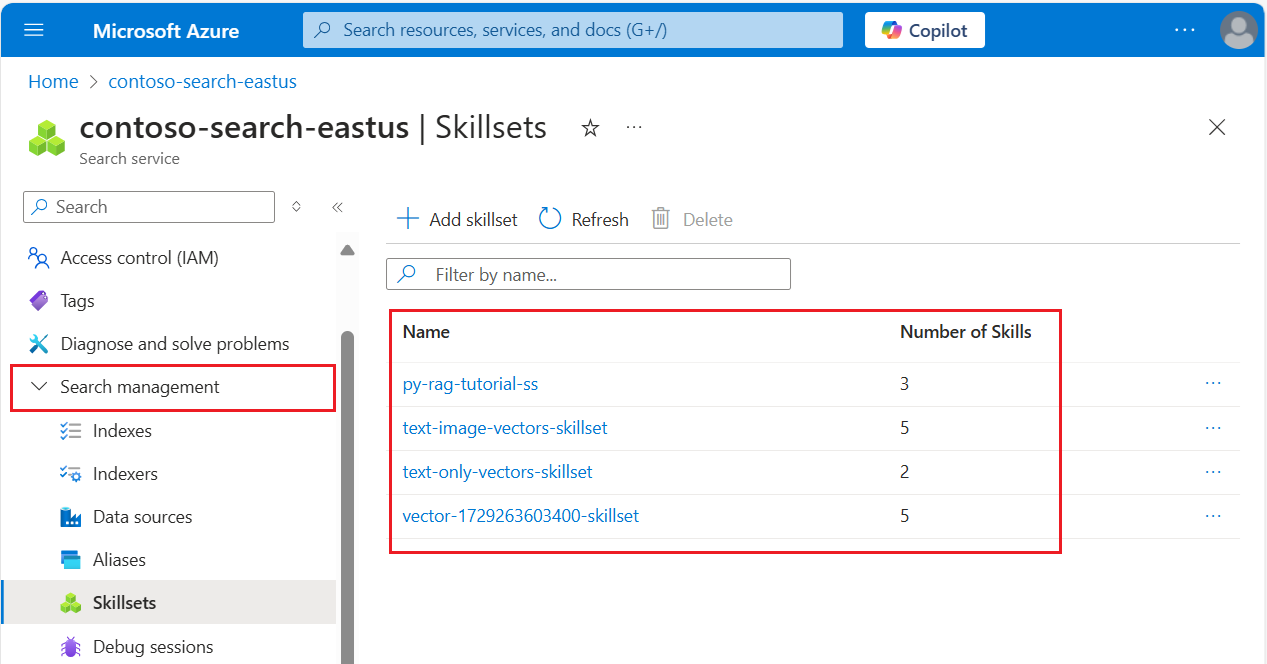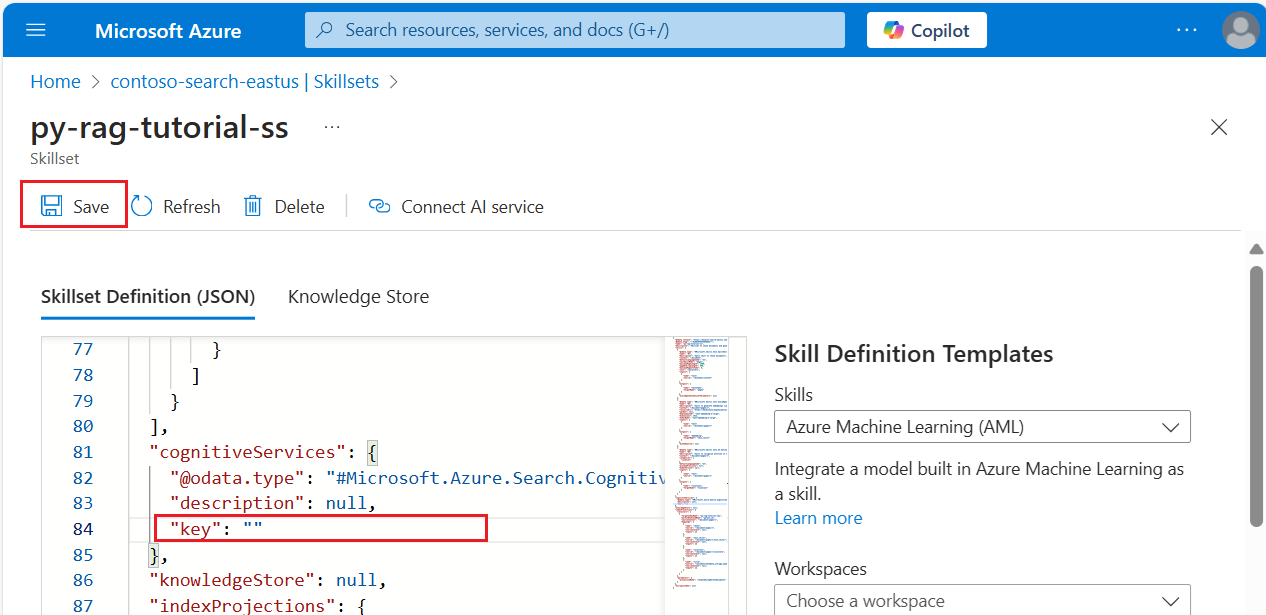Attach an Azure AI multi-service resource to a skillset in Azure AI Search
If you're using built-in skills for optional AI enrichment in Azure AI Search, you can enrich a small number of documents free of charge, limited to 20 transactions daily per index. For larger and more frequent workloads, you should attach a billable Azure AI multi-service account.
Azure AI Search uses dedicated, internally hosted Azure AI multi-service resources for built-in skills execution, but needs your multi-service account for billing purposes.
A multi-service account provides a collection of Azure AI services, rather than individual services. Providing an account in an Azure AI Search skillset allows Microsoft to charge you for using these services:
- Azure AI Vision for image analysis, optical character recognition (OCR), and multimodal embeddings
- Azure AI Language for language detection, entity recognition, sentiment analysis, and key phrase extraction
- Azure AI Speech for speech to text and text to speech
- Azure AI Translator for machine text translation
Exceptions to billing through the multi-service account include AzureOpenAIEmbedding or the AML skill billing. Azure AI Search doesn't internally host models from Azure OpenAI or the Azure AI Foundry model catalog. Usage for AML and Azure OpenAI skills and vectorizers are through Azure OpenAI pay-as-you-go pricing and Azure Machine Learning pay-as-you-go pricing, respectively. A few other skills, such as Text Split and Text Merge, aren't billable.
To attach an Azure AI multi-resource, you must provide connection information in the skillset. You can use a key on the connection, or implement a keyless approach that's currently in preview.
Tip
Azure provides infrastructure for you to monitor billing and budgets. For more information about monitoring Azure AI services, see Plan and manage costs for Azure AI services.
Prerequisites
- Connectivity over a public endpoint, unless your search service meets the creation date, tier, and region requirements for private connections to an Azure AI multi-service account.
Note
If your Azure AI resource is configured to use a private endpoint, Azure AI Search can connect using a shared private link For more information, see the requirements and limits for using shared private links.
Bill through a keyless connection
Note
This feature is currently in public preview. This preview is provided without a service-level agreement, and is not recommended for production workloads. Certain features might not be supported or might have constrained capabilities. For more information, see Supplemental Terms of Use for Microsoft Azure Previews.
Using the Azure portal or newer preview REST APIs and beta SDK packages, you can attach an Azure AI multi-service resource using a managed identity and permissions. The advantage of this approach is that billing is keyless and has no dependency on regions.
On your Azure AI multi-service resource, assign the identity to the Cognitive Services User role.
Using the Azure portal, or the Skillset 2024-11-01-preview REST API, or an Azure SDK beta package that provides the syntax, configure a skillset to use an identity:
The managed identity used on the connection belongs to the search service. It can be system managed or user assigned.
The identity must have Cognitive Services User permissions on the Azure AI resource.
@odata.typeis always#Microsoft.Azure.Search.AIServicesByIdentity.subdomainUrlis the endpoint of your Azure AI multi-service resource. The subdomain URL must include a unique name (for example,https://hereismyuniquename.cognitiveservices.azure.com). If the service was created through the Azure portal, a unique subdomain is automatically generated as part of your service setup. Ensure that your service includes a unique subdomain before using it with the Azure AI Search integration.
As with keys, the details you provide about the Azure AI Services resource are used for billing, not connections. All API requests made by Azure AI Search to Azure AI services for built-in skills processing continue to be internal and managed by Microsoft.
Example: system-assigned managed identity
Identity is set to null.
POST https://[service-name].search.windows.net/skillsets/[skillset-name]?api-version=2024-11-01-Preview
{
"name": "my skillset name",
"skills":
[
// skills definition goes here
],
"cognitiveServices": {
"@odata.type": "#Microsoft.Azure.Search.AIServicesByIdentity",
"description": "",
"subdomainUrl": “https://[subdomain-name].cognitiveservices.azure.com",
"identity": null
}
}
Example: user-assigned managed identity
Identity is set to the resource ID of the user-assigned managed identity. To find an existing user-assigned managed identity, see Manage user-assigned managed identities.
For a user-assigned managed identity, set the @odata.type and the userAssignedIdentity properties.
POST https://[service-name].search.windows.net/skillsets/[skillset-name]?api-version=2024-11-01-Preview
{
"name": "my skillset name",
"skills":
[
// skills definition goes here
],
"cognitiveServices": {
"@odata.type": "#Microsoft.Azure.Search.AIServicesByIdentity",
"description": "",
"subdomainUrl": “https://[subdomain-name].cognitiveservices.azure.com",
"identity": {
"@odata.type": "#Microsoft.Azure.Search.DataUserAssignedIdentity",
"userAssignedIdentity": ""/subscriptions/{subscription-ID}/resourceGroups/{resource-group-name}/providers/Microsoft.ManagedIdentity/userAssignedIdentities/{user-assigned-managed-identity-name}""
}
}
}
Bill through a resource key
Azure AI Search can also charge for transactions using the Azure AI multi-service resource key. This approach is the default and is generally available. You can use the Azure portal, REST API, or an Azure SDK to add the key to a skillset.
There are two supported key types: #Microsoft.Azure.Search.CognitiveServicesByKey which calls the regional endpoint and "#Microsoft.Azure.Search.AIServicesByKey which calls the subdomain. We recommend using AIServicesByKey for its shared private link support and ability to function with no regional requirements relative to the search service.
The Azure AI multi-service account must be in the same region as Azure AI Search. For more information, see Regions supported by Azure AI Search and choose a region that provides AI services integration.
If you leave the cognitiveServices property unspecified, your search service attempts to use the free enrichments available to your indexer on a daily basis. Execution of billable skills stops at 20 transactions per indexer invocation and a "Time Out" message appears in indexer execution history.
Sign in to the Azure portal.
Create an Azure AI multi-service resource in the same region as your search service.
Get the resource key from the Resources > Keys and endpoint page.
Add the key to a skillset definition:
If using an Import data wizard, create or select the Azure AI account. The wizard adds the resource key to your skillset definition.
For a new or existing skillset, provide the key in skillset definition.

Note
Azure portal currently automatically attaches key of type #Microsoft.Azure.Search.CognitiveServicesByKey.
Remove the key
Enrichments are billable operations. If you no longer need to call Azure AI services, follow these instructions to remove the multi-service key and prevent use of the external resource. Without the key, the skillset reverts to the default allocation of 20 free transactions per indexer, per day. Execution of billable skills stops at 20 transactions and a "Time Out" message appears in indexer execution history when the allocation is used up.
Sign in to the Azure portal.
Under Search management > Skillsets, select a skillset from the list.
Scroll to the section in the file containing
"cognitiveServices".Delete the key value from the JSON and save the skillset.
How the key is used
Billing goes into effect when API calls to Azure AI services resources exceed 20 API calls per indexer, per day. You can reset the indexer to reset the API count.
Keyless and key-based connections are used for billing, but not for enrichment operations' connections.
For key-based connections, a search service connects over the internal network to an Azure AI services resource that's located in the same physical region. Most regions that offer Azure AI Search also offer other Azure AI services such as Language. If you attempt AI enrichment in a region that doesn't have both services, you'll see this message: "Provided key isn't a valid CognitiveServices type key for the region of your search service."
For keyless connections, a search service authenticates using its identity and role assignment, targeting an Azure AI multi-service resource that's specified as a fully-qualified URI, having a unique subdomain in that URI.
Indexers can be configured to run in a private execution environment for dedicated processing using just the search nodes of your own search service. Even if you're using private execution environment, Azure AI Search still uses its internally provisioned Azure AI multiservice resource to perform all skill enrichments.
Note
Some built-in skills are based on non-regional Azure AI services (for example, the Text Translation Skill). Using a non-regional skill means that your request might be serviced in a region other than the Azure AI Search region. For more information on non-regional services, see the Azure AI services product by region page.
Public connection requirements
Depending on when your search service was created, and its tier and region, billing for built-in skills can require a public connection from Azure AI Search to Azure AI multi-service. Disabling public network access breaks billing in some scenarios. Review the requirements for connections through a shared private link to determine whether your search service requires a public connection.
If you can't use the public network, you can configure a Custom Web API skill implemented with an Azure Function that supports private endpoints and add the Azure AI services resource to the same VNET. In this way, you can call Azure AI services resource directly from the custom skill using private endpoints.
Key requirements special cases
Custom Entity Lookup is metered by Azure AI Search, not Azure AI services, but it requires an Azure AI multi-service resource key to unlock transactions beyond 20 per indexer, per day. For this skill only, the resource key unblocks the number of transactions, but is unrelated to billing.
Free enrichments
AI enrichment offers a small quantity of free processing of billable enrichments so that you can complete short exercises without having to attach an Azure AI multi-service resource. Free enrichments are 20 documents per day, per indexer. You can reset the indexer to reset the counter if you want to repeat an exercise.
Some enrichments are always free:
Utility skills that don't call Azure AI services (namely, Conditional, Document Extraction, Shaper, Text Merge, and Text Split skills) aren't billable.
Text extraction from PDF documents and other application files is nonbillable. Text extraction, which occurs during the document cracking, isn't an AI enrichment, but it occurs during AI enrichment and is thus noted here.
Billable enrichments
During AI enrichment, Azure AI Search calls the Azure AI services APIs for built-in skills that are based on Azure AI Vision, Translator, and Azure AI Language.
Billable built-in skills that make backend calls to Azure AI services include Entity Linking, Entity Recognition, Image Analysis, Key Phrase Extraction, Language Detection, OCR, Personally Identifiable Information (PII) Detection, Sentiment, Text Translation, and Azure AI Vision multimodal embeddings skill.
A query-time vectorizer backed by the Azure AI Vision multimodal embedding model is also a billable enrichment.
Image extraction is an Azure AI Search operation that occurs when documents are cracked prior to enrichment. Image extraction is billable on all tiers, except for 20 free daily extractions on the free tier. Image extraction costs apply to image files inside blobs, embedded images in other files (PDF and other app files), and for images extracted using Document Extraction. For image extraction pricing, see the Azure AI Search pricing page.
Tip
To lower the cost of skillset processing, enable incremental enrichment to cache and reuse any enrichments that are unaffected by changes made to a skillset. Caching requires Azure Storage (see pricing but the cumulative cost of skillset execution is lower if existing enrichments can be reused, especially for skillsets that use image extraction and analysis.
Example: Estimate costs
To estimate the costs associated with Azure AI Search indexing, start with an idea of what an average document looks like so you can run some numbers. For example, you might approximate:
- 1,000 PDFs.
- Six pages each.
- One image per page (6,000 images).
- 3,000 characters per page.
Assume a pipeline that consists of document cracking of each PDF, image and text extraction, optical character recognition (OCR) of images, and entity recognition of organizations.
The prices shown in this article are hypothetical. They're used to illustrate the estimation process. Your costs could be lower. For the actual price of transactions, see Azure AI services pricing.
For document cracking with text and image content, text extraction is currently free. For 6,000 images, assume $1 for every 1,000 images extracted. That's a cost of $6.00 for this step.
For OCR of 6,000 images in English, the OCR cognitive skill uses the best algorithm (DescribeText). Assuming a cost of $2.50 per 1,000 images to be analyzed, you would pay $15.00 for this step.
For entity extraction, you'd have a total of three text records per page. Each record is 1,000 characters. Three text records per page multiplied by 6,000 pages equal 18,000 text records. Assuming $2.00 per 1,000 text records, this step would cost $36.00.
Putting it all together, you'd pay about $57.00 to ingest 1,000 PDF documents of this type with the described skillset.

